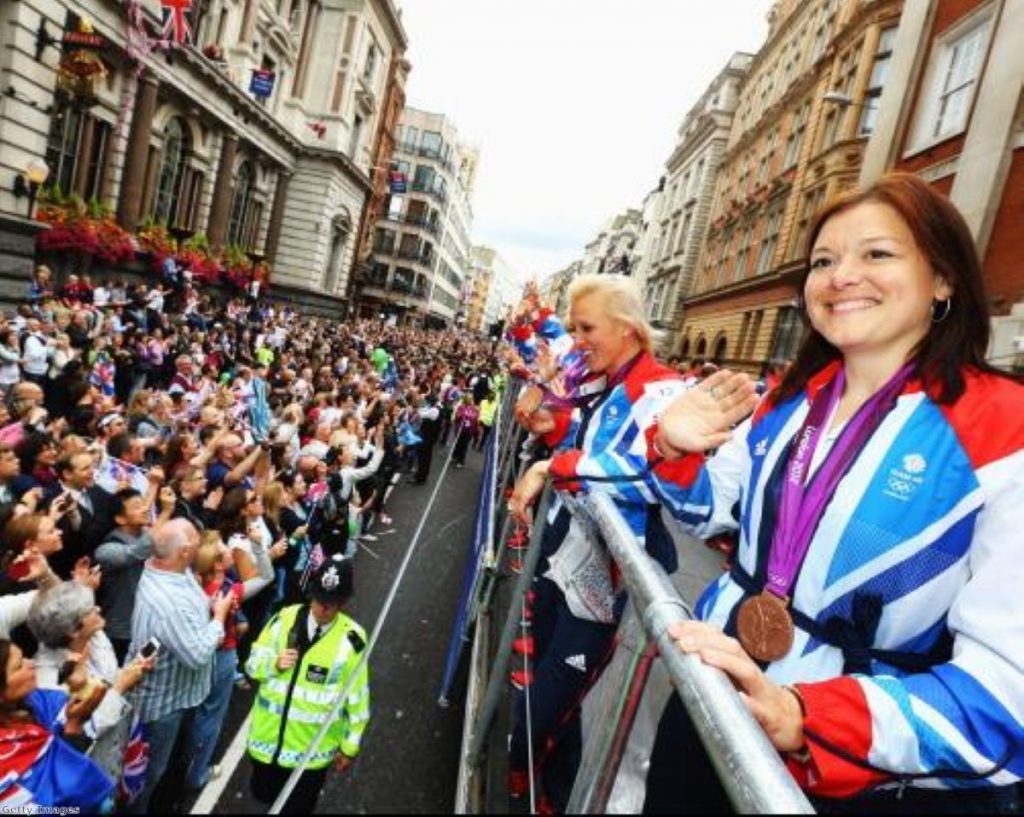Eyewitness: Britain’s troubles set aside for an Olympic parade of joy
It was a celebration of the athletes and their medals, but the London parade was a celebration of something much bigger, too. It was a celebration of Britain.
"When we're down – that's when we come up trumps!"
Rosemary could have been talking about the athletes, or the Blitz. The flag-waving, the relief at a job well done, the intense patriotism: London will have rarely seen such a display of national pride since – well, since the Golden Jubilee, anyway. Amid the misery of the double-dip recession, the UK has shown that it can still astonish the world. We're all a little astonished ourselves.
It was as if everyone in the crowd lining the Strand, where I had squirmed and wriggled my way to past hordes of desperate visitors, had passed their exams with flying colours. They seemed delighted that the country had such a big success under its belt. Instead of the disappointment of a packed capital city, crammed with frustrated, excluded Londoners, the city's transport infrastructure had performed without a squeak in its cogs. This was a Games of smiling volunteers where everything ran without a hitch. There were no big upsets, no real calamities.


Britain's self-esteem has taken one hell of a beating in recent years, but this was a real confidence-booster. The feel-good factor couldn't have been higher.
Well done to Team GB and Paralympics GB, who surpassed themselves. But well done too to the volunteers and the organisers, whose smiles and efficiency (a useful combination) really made these Games what they were. Over in Downing Street, the prime minister was talking about his desire to retain the "Olympic spirit" for as long as possible. Everyone, not just the PM, wants to keep this moment going forever. That is impossible. And so the only thing left to do is celebrate, one last time, this extraordinary summer.
This was a sight unlike any other seen in the capital in recent years. What a change from the shouting and violence of the tuition fees protests of November 2010, or the bitter taste of 2011's riots. In summer 2012 the whistling and shouting was accompanied by smiling and waving. One police officer had a union jack stuck in his helmet. Another, on a motorbike, gave a group of laughing volunteers a demonstration of his siren. A third rode along getting high fives from the crowd. Quite a turnaround from the bitterness and divisions of a troubled country seen this time last year.
The only person I could find with something negative to say was Terry, one of those people who you just know is a Londoner. He'd tried hard to get tickets for an event, any event, but hadn't been successful. "The only thing that bothers me is I couldn't get a ticket, and Tony Blair could," he said. At least he'd got to see the parade, I pointed out. Yes, he replied. But "I didn't do the war crimes, did I?"
Two nurses, in those very retro early 20thC costumes from the opening ceremony, were more relaxed. "Politics has just been on hold," Alison told me. Yes, there's a sense that "we're slowly going to go back to normal", but that's for tomorrow: today was about celebrating the athletes' achievements. Nurses are never far from politics, though. Their involvement in the opening ceremony was itself an intensely political statement from creative director Danny Boyle. He'd given David Cameron an ultimatum not to mess with the NHS, the nurses said. Through all the long, long rehearsals for the ceremony, and the intense excitement of the day itself, they accepted his word that all involved had good intentions. Political news stories about the section's inclusion were put aside during the Olympics. It felt like they were reluctant to emerge from their fairyland fantasy just yet.
A third couple, Karen and Steve from Whitechapel, were also delighted by how London 2012 had turned out. Before the Games began they were "cynical, cynical, cynical", Steve said. "But 20 minutes into the opening ceremony – bam!" Like everyone else, they had been won over. It's one of our national traits to be gloomy and put ourselves down. Yet we're capable of showing these intense emotions when the time is right, too. "I think it's brought everybody together," Rosemary said. Her message, scribbled on the DIY placards given out beforehand, read simply: "PROUD TO BE BRITISH."
Then came the cheering. Twenty-one lorries, each bearing a group of athletes, many of them with those big chunky medals around their necks. The lorries were all emblazoned with the words 'mayor of London', I couldn't help but notice. But I was probably the only one who spotted them. The eyes of those lining the streets were on those dressed in red, white and blue, cheering and grinning and waving. Jessica Ennis, Chris Hoy, Ben Ainslie, Ellie Simmonds, Katherine Grainger, the Brownlee brothers, Mo Farah obliging the crowd with his 'mobot' ad nauseam. The crowd loved it.
"You showed us the best face in Britain – who we really are – one flag, one celebration," the prime minister declared a couple of hours later outside Buckingham Palace. This was the "great British summer", one that will be remembered "for many years to come". The Red Arrows had thundered overhead, following the jumbo that had brought the flame to the UK. "It puts the great in Britain!" my fellow journalists declared with their customary sarcasm as we admired the view from Westminster. Those cheering on the Mall would have agreed.

